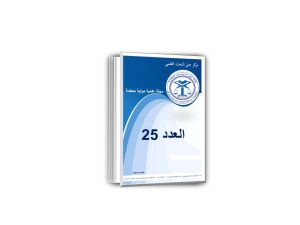
المواد المضافة إلى الأغذية والأدوية دراسة فقهية في ضوء فتاوى وقرارات المجامع الفقهية
Additional materials in food and medicine doctrinal study in the light of the fatwas and decisions of the juristic councils
ط.د. سوالمي الطاهر – ط.د. لعموري عبد الصمد (كلية العلوم الإسلامية – جامعة الجزائر -1- بن يوسف بن خدة)
Dr. Soualmi Taher – Dr. Laamouri Abdel Samad (Faculty of Islamic Sciences – University of Algiers – 1 – Ben Youssef Ben Khedda)
مقال منشور في مجلة جيل الدراسات المقارنة العدد 23 الصفحة 11.
مستخلص:
يهدف البحث الى دراسة المضافات الغذائية وأهميتها بالنسبة للمسلم ومحاولة معرفة حكمها الشرعي باعتبارها من النوازل المعاصرة وخاصة مع هذا التقدم الهائل في الصناعات الكيميائية وتوظيفها في التصنيع الغذائي، فاقتضت الحاجة لدراسة مثل هذه المواضيع وخاصة أنها تتعلق بموضوع الغذاء اليومي للمسلم، وبيان مدى تأثيرها على صحته. خصوصا أن هذا الموضوع له أهمية كبرى في وقتنا الحاضر ذلك أن معظم الصناعات الغذائية والدوائية تستعمل مواد مضافة، منها ما هو معلوم المصدر ومنها ما هو مجهول، لذا كان لزاما معرفة مصادرها والأحكام المتعلقة بها، فما هو الحكم الشرعي للمضافات الغذائية المستعملة في المنتجات الغذائية والدوائية؟
والغاية من البحث التعرف على المواد المُضافة للأغذية وتوضيح بعض الأحكام التي تتعلق بها، وطرق تقييمها ومخاطرها الصحية، وبيان حكم بعض المضافات الغذائية، مع بيان حكم الاستحالة عند الفقهاء وبيان أثر ذلك على الأحكام المتعلقة بالمضافات الغذائية، وهذا بالاعتماد على قرارات وفتاوى مجمع الفقه الإسلامي الدولي، كم تناول البحث نماذج تطبيقية لمواد مضافة مستخرجة من الخنزير وبيان حكمها.
وقد توصلنا في البحث إلى أن الاستحالة والاستهلاك من بين الطرق التي اعتمدها الفقهاء في الوصول إلى الحكم على هذه المضافات، وأن المواد النجسة والمحرمة المتحولة بإحدى الطريقتين طاهرة ويصلح تناولها، إلا ما كان أصلها من الخنزير فهي غير طاهرة ولا يصلح استعمالها كمواد غذائية مهما كان نوعها واستعمالها. ومعرفة الفرق بين مصطلحات الاستهلاك والاستحالة وأثر ذلك على الحكم المترتب على فهمها من ناحية فقهية.
كلمات مفتاحية: المضافات الغذائية ؛ الاستحالة ؛ الاستهلاك ؛ الغذاء ؛ فتاوى وقرارات.
Abstract:
The research aims to study food additives and their importance for the Muslim and try to know their legal ruling as one of the contemporary calamities, especially with this tremendous progress in the chemical industries and their use in food manufacturing, necessitated the need to study such topics, especially as they relate to the topic of daily food for the Muslim, and to indicate the extent of their impact on his health.
Especially that this topic is of great importance in the present time because most of the food and pharmaceutical industries use additives, including what is known source and what is unknown, so it was necessary to know their sources and provisions related to them, what is the Shari’a provision for food additives used in food and pharmaceutical products.
The purpose of the research is to identify food additives and clarify some of the provisions that relate to them, methods of evaluation and health risks, and to indicate the rule of some food additives, with a statement of the impossibility rule when scholars and the impact of this on the provisions related to food additives, and this is based on the decisions and fatwas of the International Islamic Fiqh Academy, how much the research dealt with applied models of additives extracted from the pig and the statement of its ruling.
We have found in the research that the impossibility and consumption are among the methods adopted by scholars in reaching judgment on these additives, and that the unclean and forbidden substances converted in one of the two ways are pure and suitable for eating, except what was originally from the pig, it is not pure and is not suitable for use as food materials of any kind and use. And to know the difference between the terms of consumption and impossibility and the impact on the consequent judgment of understanding them from a doctrinal point of view.
Keywords: food additives; impossibility; consumption; food; fatwas and decisions

